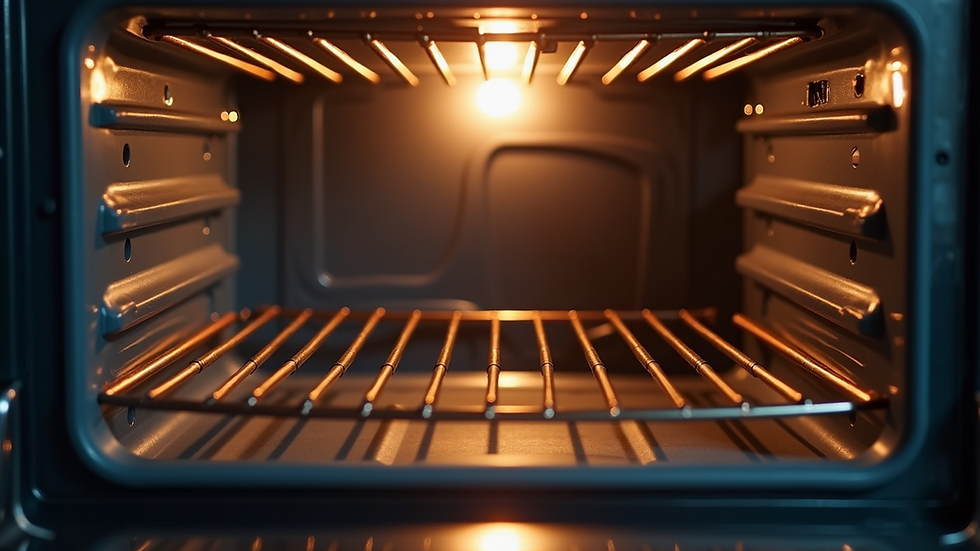Comprehensive Training for Oven Cleaning
- southlakesovenclea
- Sep 22, 2025
- 4 min read
Keeping an oven spotless is more than just a chore - it’s an art. Whether you’re a homeowner aiming for a sparkling kitchen or a business looking to maintain a professional image, mastering oven cleaning skills can make a huge difference. I’m here to walk you through everything you need to know about oven cleaning, from the basics to the benefits of professional training. Ready to roll up your sleeves? Let’s dive in!
Why Oven Cleaning Skills Training Matters
Ovens are the heart of any kitchen, but they can get grimy fast. Grease, burnt food, and spills build up, making your oven less efficient and even unsafe. That’s where oven cleaning skills training comes in. It’s not just about scrubbing; it’s about learning the right techniques, using eco-friendly products, and understanding how to protect your oven’s delicate parts.
When you train properly, you’ll save time and effort. You’ll avoid damaging your oven and keep it running smoothly for years. Plus, you’ll impress guests or customers with a gleaming appliance that looks and smells fresh.
Here’s what you’ll learn in a good training program:
How to safely dismantle oven parts for deep cleaning
The best eco-friendly cleaning agents and how to use them
Techniques to remove stubborn grease without harsh chemicals
Tips for maintaining your oven between cleanings
Health and safety practices to protect yourself and your kitchen

Getting Started with Oven Cleaning Skills Training
Starting your oven cleaning journey is easier than you think. First, gather your supplies. You’ll need:
Gloves and protective eyewear
Eco-friendly oven cleaner or homemade solutions like baking soda and vinegar
Soft cloths, sponges, and non-abrasive scrubbers
A plastic scraper for tough spots
A bucket of warm water
Next, always unplug your oven or switch off the power at the mains. Safety first! Remove all racks and trays and soak them in warm, soapy water. This loosens grime and makes scrubbing easier.
Now, apply your cleaner inside the oven. If you’re using baking soda paste, spread it evenly and let it sit for several hours or overnight. This gives it time to break down grease naturally.
When it’s time to scrub, use gentle circular motions. Avoid metal brushes or harsh abrasives that can scratch surfaces. Rinse thoroughly with a damp cloth to remove residue.
Finally, dry everything completely before reassembling. Your oven should look almost new!
If you want to take your skills further, consider enrolling in professional oven cleaning training. It’s a fantastic way to learn insider tips and techniques that save time and deliver outstanding results.

Is Oven Cleaning Profitable?
You might wonder if investing time and effort into oven cleaning skills pays off financially. The answer is a resounding yes! Whether you’re a homeowner saving on costly repairs or a business owner offering cleaning services, oven cleaning can be a lucrative venture.
For homeowners, regular cleaning extends the life of your oven and improves energy efficiency. This means lower electricity bills and fewer repairs. Plus, a clean oven reduces fire risks and keeps your kitchen smelling fresh.
For businesses, especially in hospitality or property management, offering professional oven cleaning services can attract more clients. Many people prefer eco-friendly options, so highlighting your green cleaning methods can set you apart.
If you’re considering turning this skill into a side hustle or full-time job, professional training is key. It boosts your credibility and equips you with the know-how to handle all types of ovens safely and effectively.
Remember, a well-trained cleaner can charge premium rates. Plus, word-of-mouth referrals grow quickly when you deliver spotless results every time.

Practical Tips for Maintaining Your Oven Between Deep Cleans
Keeping your oven clean doesn’t have to be a massive task every time. With a few simple habits, you can maintain a fresh oven and reduce the need for heavy-duty cleaning.
Wipe spills immediately: Don’t let food or grease bake onto surfaces. A quick wipe after cooking prevents buildup.
Use oven liners: These catch drips and crumbs, making cleanup easier.
Run a self-clean cycle: If your oven has this feature, use it regularly but follow the manufacturer’s instructions carefully.
Ventilate your kitchen: Good airflow helps reduce smoke and grease accumulation.
Check seals and gaskets: Damaged seals let heat escape and cause grime to build up faster.
By incorporating these habits, you’ll keep your oven in tip-top shape and save yourself time and effort in the long run.
Taking Your Oven Cleaning Skills to the Next Level
If you’re serious about mastering oven cleaning, consider formal training. The right course will teach you everything from basic maintenance to advanced techniques for commercial ovens. You’ll also learn about health and safety regulations, customer service, and eco-friendly practices.
South Lakes Oven Cleaning offers top-notch oven cleaning training designed for both beginners and experienced cleaners. Their hands-on approach ensures you gain confidence and practical skills that make a real difference.
Investing in training not only improves your cleaning results but also opens doors to new opportunities. Whether you want to enhance your home care routine or start a professional cleaning business, the right skills are your foundation.
Ready to Shine? Your Oven Awaits!
Cleaning an oven might seem daunting, but with the right skills and mindset, it’s a rewarding task. Think of it like giving your kitchen a fresh breath of life. A clean oven cooks better, looks better, and feels better.
Remember, start with the basics, use gentle eco-friendly products, and don’t hesitate to seek professional training if you want to excel. Your oven will thank you, and so will anyone who steps into your kitchen.
So, grab your gloves, pick your cleaner, and get ready to make your oven sparkle like new. Happy cleaning!








Comments